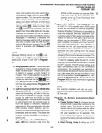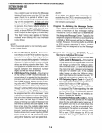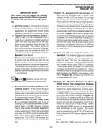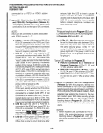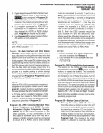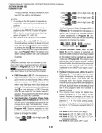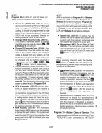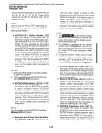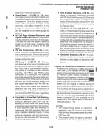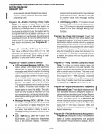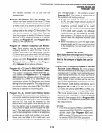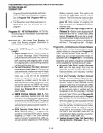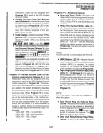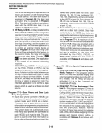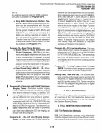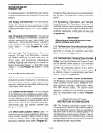
PROGRAMMINGPROCEDURES-INSTRUCTIONS/SYSTEMRECORDS
SECTION 200-096-302
FEBRUARY1991
I .
I
I .
0
0
0
long time in time-out situations.
Group Page 1 -
4, LEDs 11 w 14-lnter-
corn paging can be directed to digital and/
or electronic telephone speakers in a group
arrangement. Up to four groups are pos-
sible. This program assigns each
electronic and digital telephone to the
groups. An electronic or digital telephone
can be assigned to as many groups as
desired.
All Call Page Allowed-Electronic and
Digital Telephones, LED 1 O-Any station
may be allowed to receive an All Call page.
This does not alter the station’s ability to
initiate an All Call page. Initialized data
allows every port to receive an All Call
page.
VM (No Conference), LED 09-If acti-
vated, a station is prohibited from having
any conference calls. It should be used for
voice mail ports in order to prevent unde-
sirable conference calls.
VM Group 1 - 4, LED 05 - 08-The sys-
tem allows up to four voice mail station port
groups to be configured for support of up to
four voice mail or auto attendant devices.
One group is intended for each different
machine. All PSTU and PESU ports
connected to a particular VM machine
should be assigned to the same VM group.
The purpose of the VM grouping is to allow
efficient use of the message waiting set
and cancel operations from the VM ma-
chine. Since each digital and electronic
telephone can only have a maximum of
four messages waiting, the voice mail de-
vice should set MW only once, regardless
of how many messages there are.
Voice Mail to Voice Mail Call Blocking,
LED 04 (Release 3)-This prevents voice
mail/auto attendant ports from call for-
warding to other voice mail ports during
screened or supervised voice mail transfers.
If auto attendant calls are screened or
supervised, this LED should be ON for all
voice mail/auto attendant ports; if voice
mail/auto attendant calls are blind trans-
ferred, this LED should be OFF for all voice
mail/auto attendant ports.
l
OCA Enabled (Receive), LED 03-Any
digital or electronic telephone equipped
with Off-hook Call Announce (OCA) should
be assigned this option. If assigned, the
station will be allowed to receiveOCA. This
program does not affect the station’s ability
to originate OCA.
l
Handsfree No Warning, LED 02-Nor-
mally, a 1 -second warning tone is sent to a
handsfree digital or electronic telephone to
inform the user that someone is calling and
1
that he can be heard. If the warning tone is
not desired at the calleddigital or electronic
telephone, this assignment can disable it.
This will also prevent ringing the digital or
electronic telephone as a ring-first situa-
tion, allowing silent room monitoring of the
area surrounding the telephone. Initialized
data activates the warning tone for all ports.
l
Handsfree Disabled, LED Ol-It is pos-
sible to disable the intercom handsfree
function on any digital or electronic tele-
phone.
Program 32-Automatic Preference: Automatic
Preference for electronic or digital telephones
(see note 2) via handset off-hook or m
I
button is the automatic connection to CO lines
or intercom under various conditions. With
Ringing Line Preference, a digital or electronic
telephonegoing off-hook(orpressing them
button) may be automatically connected to the
lowest CO line ringing in without having to
press a CO line button or dial an access code.
If no CO lines are ringing and an electronic or
digital telephone goes off-hook, the station can 1
be automatically connected to intercom or to a
CO line. The CO line connected can be the
lowest numbered CO line available on the
telephone or the highest idle CO line from a
selected group (1 +- 8).
NOTES:
1. The programming digital or electronic 1
telephone, port 05, is set to auto select
Intercom any time system power is turned
OFF then ON.
2. This program does hot app& to standard
telephones. To allow system features to I
2-13



